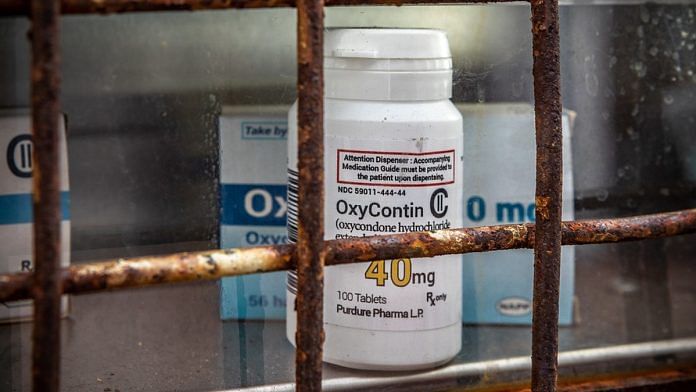New Delhi: A total of 24 blockbuster drugs, with global sales worth $251 billion, have lost or are set to lose their patents in the US by 2030, which could unleash major business and growth opportunities for Indian pharma companies, says a report by the Centre’s Department of Pharmaceuticals (DoP).
According to the report, India’s pharmaceutical sector is bound to see massive potential for the entry of generic drugs during the 2022-2030 period. Mega-selling anti-rheumatic drug Humira’s patent has already expired, while anti-cancer drugs — Keytruda, Opdivo, Revlimid and Avastin — and anti-diabetic and obesity drugs — Victoza, Januvia and Trulicity, among others — are nearing patent expiration.
Some other high-selling drugs in the list include Stelara, a drug against a chronic digestive condition called Crohn’s disease, and OxyContin, a painkiller.
The expiry of patents would mean that drugmakers will be able to launch the generic versions of these drugs, which are typically priced up to 90 percent lower than their innovator drug. This will allow healthcare providers and insurers to achieve substantial cost savings, the report suggests.
The report, which ThePrint has accessed, has been prepared for the government by Biovantis Healthcare, a health data science and compliance company. It adds that the impending patent loss will affect most big biopharma players in the US and Europe, but some, such as Pfizer, Novartis, Merck, Eli Lilly and Bristol Myers Squibb, are poised to face the steepest patent cliffs or loss of revenue, it adds.
“Through the exercise, which spanned around six months, our aim was to identify the growth of the business potential in the US and other global markets,” said a senior DoP official.
The Indian generic pharmaceutical market has witnessed remarkable growth over the years, the report underlines. According to DoP’s Annual Report 2022-23, the total annual turnover of pharmaceuticals in the fiscal year 2021-22 in India was approximately $42.34 billion.
Also Read: Organ transplants involving foreigners under scanner, Centre asks states to investigate such cases
Need for a shift to biosimilars
Drugs can be roughly split into two categories based on their technical characteristics — pharmaceutical or small-molecule drugs, and biologics or large-molecule drugs, such as vaccines, monoclonal antibodies and immune modulators that are derived from biological sources.
Small-molecule drugs are typically simpler to manufacture and cheaper for the purchaser, but the report notes that while Indian drug makers have far more experience in making generic versions of these drugs, the mega-selling drugs going off-patent are mostly biologics. This implies that it may be a challenge for Indian drug manufacturers to produce their biosimilars (generic versions of biologic drugs).
“Indian generic companies have wide experience of reverse engineering the chemical drugs to develop generic versions and transfer the technology for the mass production. However, for the biosimilar, the development and technology transfer are challenges. Further, the types of patents used for small-molecule and biologic drugs, and the strategies for using (or attacking) these patents are also very different from biosimilars,” it says.
The report also notes the regulatory and commercial consideration in gaining approval for new or follower small-molecule and biologic drugs are very different, making biosimilars a riskier and more complex proposition for Indian generic companies.
So far, only a few Indian companies have forayed into this space and developed initial capabilities, but others quickly need to expand their capacities.
The global generic drugs market was valued at approximately $228 billion in 2020, and is expected to reach a value of $380 billion by 2030, growing at a compound annual growth rate (CAGR) of around 6.2 percent during the forecast period.
“The global generic pharmaceutical market is highly competitive, and several major players operate on a global scale. These companies have established themselves as leaders in the generic drug industry, supplying a wide range of affordable medications worldwide,” the report adds. listing top 15 generic suppliers globally.
It goes on to list the top 15 generic suppliers globally, which includes seven Indian companies — Sun Pharma, Dr Reddy’s Laboratories, Lupin, Cipla, Aurobindo Pharma, Zydus Cadila and Torrent Pharma.
Also Read: MDH, Everest asked to give details of quality checks after Hong Kong, Singapore raise concerns
India’s pharma space: Quality concerns a problem?
The report deems Indian generic pharmaceutical industry as one of the largest and fastest growing sectors in the country, and adds that India boasts of more than 600 US Food and Drug Administration (USFDA)-approved manufacturing sites, constituting nearly 12.5 percent of all registered manufacturing facilities operating outside the US.
Also, there are 500 API (active pharmaceutical ingredient) manufacturers, contributing 8 percent to the global API Industry. In addition, India is the largest supplier of generic medicines with 20 percent share in the global supply as it manufactures 60,000 different generic brands across 60 therapeutic categories.
The country exports approximately 30 percent of its total pharmaceutical exports to the US, the report says, but also lists quality concerns as a key weakness of the Indian pharmaceutical sector.
The report highlights that while India has many reputable drug manufacturers, the industry has also faced concerns regarding quality and compliance.
Maintaining consistent quality and compliance with Good Manufacturing Practices (GMP) is crucial for the reputation and success of pharmaceutical companies, it has underlined, adding that non-compliance and quality issues can lead to regulatory action, import bans, and damage to the industry’s image.
“The Indian pharmaceutical market has faced challenges with counterfeit and substandard drugs. These products not only pose risks to patient safety, but also harm the reputation of the industry. Strengthening regulatory oversight and implementing robust supply chain controls are necessary to address this issue,” the report says.
Recent instances of non-compliance with quality and regulatory standards have brought India under the scanner of regulatory authorities, it noted.
(Edited by Mannat Chugh)
Also Read: Nestle’s ‘double standard’ — baby food has added sugar in India, not in rich countries



